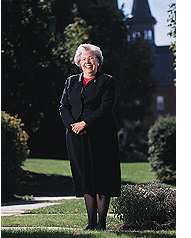

| SEARCH |
| UVM A TO Z |
| WHITE PAGES |
| UVM HOME |
 Educating for a global society
Educating for a global society
In November, I co-chaired a Salzburg Seminar in Salzburg, Austria, on the topic of globalization and the role of universities. To no one’s surprise, none of the participants from fourteen different countries in Europe could agree on what globalization means. We all knew that globalization connotes a host of economic, political, and social forces that are causing all of us to be affected by events in places we have never visited and may never see. At one level, it is a catch-all phrase that carries the idea of “anything unsettling that has happened since around 1970, and in Europe, after 1990.” At another level, it is a new environment made up of electronic communications, the ascendancy of markets over governments in the allocation of resources, and the ability to acquire wealth and power through knowledge-based production rather than the control of natural resources.
What do these changes mean for higher education? No one can learn another culture without thoroughly studying and reflecting upon his or her own experience and acting on that knowledge. Yet knowing our own culture does not automatically prepare us to understand other cultures. Perhaps this is why study abroad is often such a transformative experience for our students, who, for the first time, discover that their own ways of knowing are not shared around the world.
To succeed in a global age, students must derive strength and inspiration from the personal and intellectual connections they can make within our campuses and the surrounding communities. They also must acquire the ability to understand the places and people they will encounter in the future, and they must be prepared to work across borders and cultures.
What does this mean in everyday terms? As one UVM alumna recently told me, to “act globally” our students need flexibility, openness, diplomacy, and “street smarts.”
To this alumna, street smarts means the ability to read a situation accurately, to think on your feet, and to communicate with people across languages and cultures. Most of all, it means helping students learn that they do not yet know enough and that they must continue to learn.
How can we prepare our students effectively for a global experience? First, despite appearances, English is not a true lingua franca. Professor Kevin McKenna, German & Russian Department, recently wrote: “Sadly, we Americans take far too much advantage of the widespread currency of English throughout the world.” Just because people in virtually all of our overseas markets speak English doesn’t mean we really know “their languages, their cultures, and how things get done, processed, shipped, and marketed in those countries.”
For those who cannot take the time or lack the money for the transformative experience of study abroad, we should offer alternate avenues to experience other cultures and languages. Students in our business school, for example, develop Web sites that are evaluated online by reviewers from several countries. Students who study Russian interview our Russian exchange students (in Russian, of course) and make presentations on the people they have interviewed.
There are many ways to prepare students to know about the culture, history, government, economy, and values of the people around the world, but there is nothing like the effect of direct experience with another culture and language, on our campus or abroad. The bumper sticker is right.
We must “act locally and think globally.” VQ
For the past year, President Judith Ramaley has written a column for Trusteeship, a journal for higher education leaders that is published by the Association of Governing Boards. A version of this essay originally appeared in that publication.